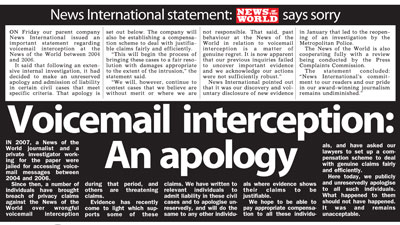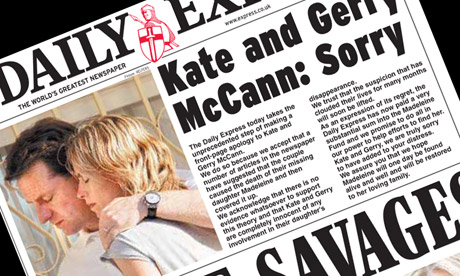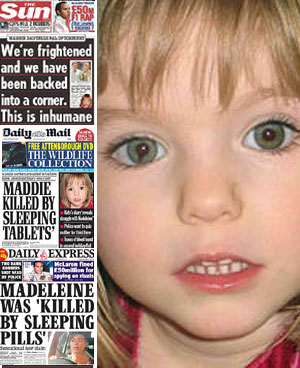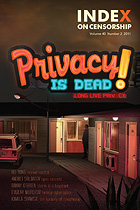 Journalists are being tarnished by the activities of professional privacy invaders. It is time they were renamed and shamed, argues Brian Cathcart
Journalists are being tarnished by the activities of professional privacy invaders. It is time they were renamed and shamed, argues Brian Cathcart
There is a confusion at the heart of British debates about privacy. We tend to speak of journalists, of their role, their rights, their responsibilities and very often their lack of restraint and how it should be addressed. But this is misleading, and prevents us from seeing some of the complexities and possibilities, because the word ‘journalist’, in this context, covers two very different groups of people. One group is the actual journalists, as traditionally understood, and the other is those people whose principal professional activity is invading other people’s privacy for the purpose of publication.
The difference between the two, when you pause to consider it, is profound. Journalism is demonstrably valuable to society. It tells us what is new, important and interesting in public life, it holds authority to account, it promotes informed debate, it entertains and enlightens. For sure, it comes with complications. It is rushed and imperfect, it sometimes upsets people and in pursuit of its objectives it occasionally does unpleasant or even illegal things. But by and large we accept these less welcome aspects of journalism as part of the package, and we do so because journalism as a whole is in the public interest. It does good, or to put it another way, we would be much poorer without it.
Invading people’s privacy for the purpose of publication does not do good, though it may make money. In that industry, deception and payment for information are routine, not exceptional. The subject matter is almost never important — except to the victims, whose lives may be permanently blighted – and while a story may entertain, it does so only in the way that bear-baiting and public executions used to entertain. The whole activity exists on the border of legality, skipping from one side of the line to the other at its own convenience and without sincere regard for the public interest.
If they are so different, why do we tend to lump them together? A number of reasons. One is that journalists themselves are slow to draw the distinction because theirs is traditionally an open industry, without barriers and categories, and also because they don’t tend to think of what they do in terms of doing good and being valuable. But there is also a more tangible explanation, which is that the privacy invaders do everything they can to blur the line. It is in their interest to be considered journalists, after all. They can shelter under the same umbrella and enjoy the same privileges as journalists. They can talk about freedom of expression, freedom of the press and serving the public interest; they can appeal to tradition and history and they can sound warnings about current and future censorship. This helps them to protect what they do.
 Today, in 2011, the activities of the privacy invaders have provoked a crisis which threatens to compromise and damage the journalism that is done in the public interest. After a succession of scandals, the worst of them associated with Rupert Murdoch’s News of the World, the demand for tighter legal constraints on the news media has reached a level not seen for many years. This is probably not another “last chance saloon” episode, with empty warnings and hollow condemnations, as was seen in the early 1990s, because the centre of gravity in the debate has shifted. Many people in Parliament, the law and the media itself who were previously vital to the defence of press freedom are in despair. They watch in particular the phone hacking scandal, in which the News of the World has been forced to admit illegally accessing people’s voicemails on an astonishing scale, and they feel that the press is out of control and unwilling to take responsibility for its failures. There is a strong chance that the next year or so will bring important change.
Today, in 2011, the activities of the privacy invaders have provoked a crisis which threatens to compromise and damage the journalism that is done in the public interest. After a succession of scandals, the worst of them associated with Rupert Murdoch’s News of the World, the demand for tighter legal constraints on the news media has reached a level not seen for many years. This is probably not another “last chance saloon” episode, with empty warnings and hollow condemnations, as was seen in the early 1990s, because the centre of gravity in the debate has shifted. Many people in Parliament, the law and the media itself who were previously vital to the defence of press freedom are in despair. They watch in particular the phone hacking scandal, in which the News of the World has been forced to admit illegally accessing people’s voicemails on an astonishing scale, and they feel that the press is out of control and unwilling to take responsibility for its failures. There is a strong chance that the next year or so will bring important change.
The greater the threat of effective press regulation, the more the privacy invaders can be counted upon to press their claim to be journalists, and so part of the free-speech tradition. They are like drowning men in the water, clinging on for dear life to those who have lifejackets. But journalists, for their part, may be approaching a moment of choice. Do they acknowledge the difference, the better to protect their own interests, or do they risk being dragged down into the depths by the sinking privacy invaders?
And it is not just a moment of choice for journalists. The reading public also needs a clearer understanding. We need to recognise privacy invasion for what it is, to accept that a luridly packaged, sensational, self-promoting and at the same time self-righteous product is actually bad for our collective health. And we need to grasp better the distinction between that and what is genuinely done in the public interest.
Privacy invaders at work: the Max Mosley case
The most vivid recent example of the privacy invaders at work, and the one which most clearly shows that what they do is not journalism, is the case of
Max Mosley, the former president of the Federation Internationale de l’Automobile. Because Mosley sued, details of a modus operandi which normally remains hidden were exposed. The story is well known, but details are worth revisiting.
 In March 2008, the News of the World persuaded a woman who participated in private S&M parties with Mosley to film one of these events secretly, promising her £25,000 if the resulting story made the front page. A reporter was recorded showing her how to use the camera and saying how far away from Mosley she should stand “when you want to get him to do the Sieg Heil”. The party took place and the paper got its film. There was no Sieg Heil, but some German was spoken in one role-play scene (by a participant who was German) and joke-shop prison uniforms were worn in another. In the paper’s view, this established a useful connection — Mosley’s father had led the wartime British fascist movement. The story appeared under the headline: “F1 boss has sick Nazi orgy with 5 hookers”.
In March 2008, the News of the World persuaded a woman who participated in private S&M parties with Mosley to film one of these events secretly, promising her £25,000 if the resulting story made the front page. A reporter was recorded showing her how to use the camera and saying how far away from Mosley she should stand “when you want to get him to do the Sieg Heil”. The party took place and the paper got its film. There was no Sieg Heil, but some German was spoken in one role-play scene (by a participant who was German) and joke-shop prison uniforms were worn in another. In the paper’s view, this established a useful connection — Mosley’s father had led the wartime British fascist movement. The story appeared under the headline: “F1 boss has sick Nazi orgy with 5 hookers”.
The next week, for a follow-up story, the paper approached two other women participants and told them to choose between being identified in print and giving an interview. They refused to cooperate, so the paper returned to the first woman. Her payment had been unilaterally reduced from the promised £25,000 to £12,000, but she was now told she could earn a further £8,000 if she gave an interview. (It was alleged in court that she too was threatened with exposure.) She agreed, but the court heard that her role in the interview involved nothing more than signing the first page of a text that had already been written, and which was altered between signature and publication. It appeared under the headline: “Mosley hooker tells all”.
Besides the fact that it appeared in a newspaper, there is almost nothing here that qualifies as journalism. For one, the whole approach is difficult to reconcile with the code of practice of the Press Complaints Commission (PCC), which at least in principle binds journalists working for member organisations and which includes clauses on such matters as accuracy, privacy and the use of subterfuge. The code makes clear, for example, that it is not acceptable to employ a clandestine recording device on a ‘fishing expedition’ — in other words, when you don’t have good grounds to expect you will gain a particular kind of evidence of a particular kind of wrongdoing. Though the paper made desperate efforts in court to create the impression that it had had such grounds, the judge would not credit them and indeed no reasonable person would have.
In a way, though, the terms of the code were the least of it. This may sound pious, but it is a simple fact that journalism has to be about truth. If a reporter is not trying to write about the world as he or she sincerely believes it to be, then the product is not journalism. It is fiction passing itself off as journalism. In this case the paper didn’t get what it hoped for (the Sieg Heil) but relied instead on some other German words it didn’t understand and did not bother to have translated. (German = Nazi to the News of the World.) The paper promised its informant £25,000 and then paid her £12,000 because it knew she could not hold it to its word. It threatened people with exposure if they did not cooperate, but in court denied this was blackmail. It presented its readers with an ‘interview’ which was nothing of the kind. Even in court it could not get its facts straight. The judge observed of the author of the supposed interview: “… his best recollection is so erratic and changeable that it would not be safe to place unqualified reliance on his evidence”. And yet for all the shameful conduct that was laid bare, no one at the paper was disciplined or reprimanded, let alone sacked. In other words, this is what the News of the World does.
More than anything, though, it is in their attitude to the public interest that the privacy invaders mark themselves out as different. The public interest is central because it is a sort of get-out-of-jail card for journalists, though it is actually recognised only grudgingly in law. An ethical journalist can justify telling a lie, or covertly recording a conversation, or trespassing if this act is done in the pursuit of the public interest, and even if he or she is found guilty of an offence, others will usually understand this as valid and will give their support. The public interest can literally keep a journalist out of jail, and it is not merely in the eye of the beholder. The Press Complaints Commission, for example, defines it as follows:
The public interest includes, but is not confined to:
i) Detecting or exposing crime or serious impropriety
ii) Protecting public health and safety
iii) Preventing the public from being misled by an action or statement of an individual or organisation
How did the News of the World justify publishing the Mosley story, which concerned legal sexual activity between consenting adults? Mosley’s behaviour, the trial was told, was “so debased, so depraved that the law will not offer it protection from disclosure”. The alleged Nazi elements of his activities were said to have mocked the Holocaust and, when combined with Mosley’s family background, contributed to a “disturbing situation” which was of “legitimate public interest”. Colin Myler, the paper’s editor, further claimed that exposure was justified because “as the head of Formula One Mr Mosley is the figurehead for the sport. He’s invited to the opening gala dinners, whether it’s with princes, prime ministers, kings, queens and presidents”. And the paper also argued that the beating which took place during the session amounted to a form of assault which it was legitimate to expose, and that Mosley’s relationship with the women amounted to illegal brothel-keeping.
Not only did the court reject every one of these arguments but it also exposed the cynicism with which they had been prepared. The assault argument, put forward only after Mosley sued, was dismissed by the judge as “artificial” and “verging on desperation”. The brothel-keeping charge, he noted, had been “thought up” by the paper’s lawyers, only to be “abandoned” before the trial’s end. As for the Nazi theme, it turned out to have no foundation in fact — and here the judge’s remarks revealed just how a public interest defence works in the hands of privacy invaders. He said he was ‘prepared to believe’ that the paper’s editors and reporters, “on what they had seen, thought there was a Nazi element – not least because that is what they wanted to believe. Indeed they needed to believe this in order to forge the somewhat tenuous link between the claimant [Mosley] and his father’s notorious activities more than half a century ago, and, secondly, to construct an arguable public interest defence …”
There was no cool assessment of the evidence, therefore, and no measured calculation of whether this was really one of those rare cases where intrusion into someone’s most private affairs could be justified because exposure makes the world a better place. This was about what they wanted and needed to believe if they were to publish –– and they were determined to publish. In other words, the story comes first and then, as the judge put it, you “construct an arguable public interest defence”. And if that defence doesn’t work you try another, and another, and another. This is not how journalists behave. They don’t “think up” public interest cases which are “artificial”, and they don’t allow themselves to believe something just because it suits them. They don’t abuse the entire ethical structure just so they can get whatever it is they know or believe they know into print. Certainly they get things wrong sometimes and they make misjudgments, but their general aim is to act ethically, just as it is to act truthfully.
Deception, muddy waters and the right to know
The suggestion that journalists are ethically driven often provokes sniggering, because many people believe the opposite. Yet journalists spend more of their time confronting and worrying about ethical questions than people in most other walks of life. Being accurate, balanced, fair and responsible while turning around a product that is acutely time-sensitive is demanding. You will not always agree with the decisions they make, but it is a simple fact that professional publications and professional journalists take these matters seriously though the procedures are often not formal. It is obvious, however, that no such scruples attended the preparation of the News of the World’s Mosley scoops, and it would be hard to exaggerate how far recklessness has damaged the name of journalism in recent years.
 The coverage of the disappearance of Madeleine McCann in 2007, when a dozen national newspapers printed between them hundreds of grossly libellous stories on their front pages over a period of nearly a year, is probably the most shocking instance (though it was not a privacy issue). The Express papers were the worst offenders on that occasion, forced to pay a reported £550,000 in damages – and what soul-searching followed? What did the then editor of the Daily Express, Peter Hill, do to ensure it could not happen again? He famously told MPs: “I have reprimanded myself.” Journalists tend to laugh or shrug at this but they should take it seriously, because with those words Hill was mocking what they do for a living.
The coverage of the disappearance of Madeleine McCann in 2007, when a dozen national newspapers printed between them hundreds of grossly libellous stories on their front pages over a period of nearly a year, is probably the most shocking instance (though it was not a privacy issue). The Express papers were the worst offenders on that occasion, forced to pay a reported £550,000 in damages – and what soul-searching followed? What did the then editor of the Daily Express, Peter Hill, do to ensure it could not happen again? He famously told MPs: “I have reprimanded myself.” Journalists tend to laugh or shrug at this but they should take it seriously, because with those words Hill was mocking what they do for a living.
In both motivation and method, the Mosley case demonstrates, journalism is distinct from the industry of privacy invasion. But the privacy invaders prefer to muddy the water. When the News of the World lost that case it announced that “our press is less free today after this judgment” — appealing, by implication, to a noble British history and British tradition of press freedom. Now press freedom is an important matter and its history is certainly rich in noble deeds, but William Cobbett and John Wilkes did not suffer imprisonment and exile to enable journalists to bribe, bully and deceive their way into other people’s bedrooms. Nor, if you forgive the anachronism, did they have in mind the sort of people who would illegally hack into the mobile phone messages of the famous on the off-chance they might learn something titillating. These martyrs in the cause of press freedom had some meaningful conception that the press needed to be free to serve the public interest, and they did not see the public interest merely as a smokescreen.
You may by now be thinking that this is all very precious, and wouldn’t it be a dull world if we didn’t have these naughty boys in the tabloids blowing raspberries and shaking things up? It’s a comfortable attitude so long as you are not at risk of being a victim of the intrusion for which it is a cover, and so long as you don’t care that innocent people suffer for it. But spare a thought for those of us who teach the journalists of the future. What are we supposed to tell them? “Don’t worry about ethics because, so long as only a minority of people suffer from what you do, the majority will thank you for making the world a more diverting place”? That is not a viable attitude.

The privacy invaders use another version of that argument. They suggest that they are journalists, but the anarchic, irreverent, pushy part of the business, keeping the rest on its toes and preventing complacency. Again this isn’t viable. They don’t keep journalism virtuous; they drag it down, routinely showing contempt for the kind of boundaries they demand to see enforced in every other part of society. When the News of the World was convicted of illegally breaching Max Mosley’s privacy, it raised two fingers to the court, attacked the judge and the law and did nothing whatever to alter its habits. When the Express was caught libelling the McCanns, nobody was disciplined and nothing changed and, as we have seen, the editor mocked the idea that it should be otherwise. When Gordon Taylor, head of the Professional Footballers’ Association, produced evidence in 2008 that his phone had been hacked by the News of the World, the paper paid him £700,000 to shut up and go away.
For the privacy intruders the water can never be muddy enough. We are told that celebrities collaborate in their own exposure and it’s all part of the modern publicity industry. Often true, no doubt, but not always — and any journalist should be able to tell the difference between the person who wants to tell or sell a story and the person who has to be stalked, deceived and bullied for a story. We are told that public figures have an obligation to behave in certain ways because they are “role models”. Among the many problems with this are that the standards are arbitrarily set by editors and inconsistently applied, simply because the test is not what is right or wrong but what will sell newspapers on a given day. And editors who live by such dictates (and rely on dubious means to get their stories) are surely the last people we should rely on to judge what is appropriate conduct and what is not. We are also told that this is all about power and privilege, that the protection of privacy is a confidence trick designed to conceal from us the wrongdoing of top people. This is a con trick in itself. It just happens that editors aren’t usually interested in intruding upon the privacy of the poor, but when the time comes that they are — say in the case of victims of crime or with bereaved families — they often show no mercy. Rich or poor, they will stitch you up if it suits them.
 Paul Dacre, the editor of the Daily Mail, has offered a different and curious defence. In a speech in 2008 he argued: “… if mass-circulation newspapers, which also devote considerable space to reporting and analysis of public affairs, don’t have the freedom to write about scandal, I doubt whether they will retain their mass circulations with the obvious worrying implications for the democratic process”. This implies that professional intrusion into privacy is a price society has to pay if people are to be informed about things that are genuinely in the public interest. That can’t be right. It is true that the News of the World carries coverage of public affairs, indeed it occasionally prints front-page stories which are genuinely in the public interest — its coverage of match-fixing in cricket was a case in point. But journalists know that every story has to stand on its own ethical merits. Because you have published one worthy story does not mean that in the next one you have a licence to intrude. That is like saying that if you get 20 stories right you are free to commit a libel in the 21st, providing the story helps to keep your paper afloat. If the News of the World is to survive, it should pay its way by reporting in the public interest, full stop.
Paul Dacre, the editor of the Daily Mail, has offered a different and curious defence. In a speech in 2008 he argued: “… if mass-circulation newspapers, which also devote considerable space to reporting and analysis of public affairs, don’t have the freedom to write about scandal, I doubt whether they will retain their mass circulations with the obvious worrying implications for the democratic process”. This implies that professional intrusion into privacy is a price society has to pay if people are to be informed about things that are genuinely in the public interest. That can’t be right. It is true that the News of the World carries coverage of public affairs, indeed it occasionally prints front-page stories which are genuinely in the public interest — its coverage of match-fixing in cricket was a case in point. But journalists know that every story has to stand on its own ethical merits. Because you have published one worthy story does not mean that in the next one you have a licence to intrude. That is like saying that if you get 20 stories right you are free to commit a libel in the 21st, providing the story helps to keep your paper afloat. If the News of the World is to survive, it should pay its way by reporting in the public interest, full stop.
Let us say, then, that we are going to make a distinction between journalism and intruding in people’s privacy. Two questions immediately arise. First, where is the line between the two? And second, what difference does it make?
This is not simply a matter of drawing a line between tabloids and broadsheets, as they used to be, or between populars and qualities, as they were before that. In the first instance, we are identifying a kind of activity, but from there it is a short step to knowing who the people are who routinely engage in that activity, and which are the organisations that encourage, condone and trade by it. It is not all that complicated. The new non-journalist category, incidentally, will include some people not previously thought of as journalists, people like Glenn Mulcaire, Jonathan Rees and Steve Whittamore — private detectives who in their day were employed by the News of the World and who have all, incidentally, been convicted of crimes. Is this snobbish? Only if you believe there is something elitist about having ethical standards. Is it realistic? If we put aside the obfuscation, and make the effort to recognise these distinctive activities when we see them, yes. It really is not such an effort to tell the difference between those who want to inform and entertain and those who share the motivation of the former assistant news editor on the News of the World who told a colleague in 2002: “This is what we do. … We go out and destroy other people’s lives.” And it could be argued that making the distinction might strengthen the hand of those people in the relevant organisations who want to behave ethically.
An urgent matter
Will it make a difference? Certainly not in the sense that it will solve the privacy problem, and put an end to unjustified intrusion. That argument will run and run, and it is likely that no satisfactory boundaries will ever be fixed. Moreover the intruders, who are resourceful, will find ways to shield at least some of what they do. But the distinction will help to clarify the debate by separating those participants who have no real interest in ethical conduct or the public interest from those who do. It will more clearly expose the interests of those who argue that that law which allows scrutiny of the activities of a corporation must also allow scrutiny of the private life of an individual. And it will surely lend extra weight to the demands of journalists to be free to do what is genuinely the work of journalism.
This is an urgent matter. Because of the serial horrors — McCann, Mosley, hacking — the demand for statutory regulation of the press is growing. The Press Complaints Commission has failed to shore up standards or to convince the public that the press is sincere in wanting to regulate itself. If journalists, for reasons of nostalgia, inertia, confusion or misplaced loyalty, choose to keep swimming with the privacy intruders, they may well drown with them. If they push themselves free, then there is a better chance that we will find ways of protecting the freedoms that are vital to journalism.
Most of all, though, a clearer distinction will benefit the reading public. The more distance that opens up between ethical journalism and professional intrusion into privacy, the more the public will understand what it is getting and what it can trust. And that is in the public interest.
Brian Cathcart’s “Code breakers” appears in the new issue of Index on Censorship magazine, Privacy is dead! long live privacy, available now.
Brian Cathcart is professor of journalism at Kingston University and former media columnist at the New Statesman. He was a journalist at Reuters and the Independent. His books include The Case of Stephen Lawrence (Penguin). He is a regular contributor to Index online.





